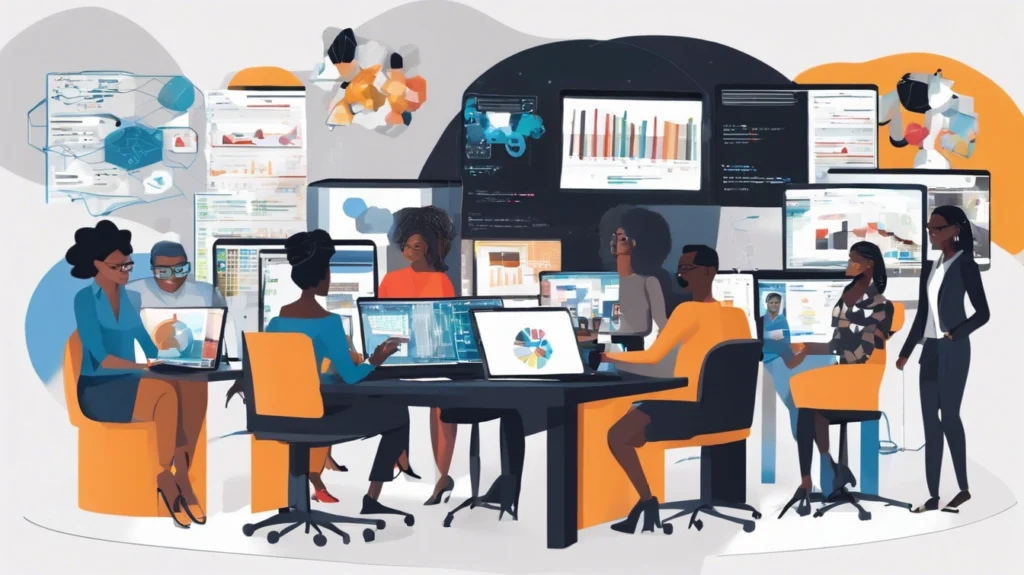The tech industry is evolving rapidly, and Black people are playing an increasingly vital role in shaping its future. Despite historical underrepresentation in the Information Technology (IT) field, Black professionals are now breaking barriers, driving innovation, and making significant contributions. Their involvement is crucial not just for diversity’s sake, but because they bring unique perspectives, skills, and life experiences that are essential for a more inclusive and equitable tech landscape. This blog will explore ten IT career paths and highlight the importance of Black professionals in these roles, along with real-world examples of their impact.
1. Software Development
Software developers create the applications and programs that power everything from our smartphones to the cloud. Black software engineers are essential in ensuring that the applications we use are more inclusive and representative of the diverse populations they serve.
Example: Kimberly Bryant, founder of Black Girls Code, is making waves in the software development world by encouraging young Black girls to pursue coding and programming. Her organization helps develop the next generation of Black female software developers.
2. Cybersecurity
With the growing threat of cyberattacks, cybersecurity professionals protect sensitive information from hackers and ensure the safety of digital infrastructure. Black cybersecurity experts are increasingly leading efforts to protect both corporate and public entities from data breaches.
Example: Frederick Lee, also known as “Flee,” is the Chief Security Officer at Gusto, where he oversees cybersecurity for millions of users. His efforts ensure that customer data remains secure in a world where cyber threats are constantly evolving.
3. Data Science and Analytics
Data scientists analyze complex data to uncover insights that can shape business decisions, healthcare solutions, and more. Black data scientists bring vital perspectives to analyzing data trends, helping reduce bias in predictive models and algorithms.
Example: Ayodele Odubela, a prominent Black data scientist, is known for her work in AI ethics and combating algorithmic bias. She’s helped design more inclusive data systems by addressing how AI can disproportionately affect communities of color.
4. Artificial Intelligence (AI) and Machine Learning
AI and machine learning (ML) are reshaping industries by enabling computers to learn from data and make decisions. Black professionals in AI are crucial in ensuring these systems are built without harmful biases and reflect the needs of diverse users.
Example: Timnit Gebru, a former co-lead of the Ethical AI team at Google, is known for her groundbreaking research on how AI can reinforce bias and discrimination. Her advocacy has brought global attention to the ethical challenges in machine learning systems.
5. IT Project Management
IT project managers oversee the planning, execution, and delivery of technology projects, ensuring they stay on track and meet business goals. Black IT project managers play a key role in managing diverse teams and incorporating inclusive leadership into tech projects.
Example: Stephanie Lampkin, founder of Blendoor, uses her project management expertise to lead a company that focuses on reducing bias in hiring through technology. Her work aims to increase diversity in tech companies by providing fairer hiring processes.
6. Cloud Computing
Cloud computing experts manage the infrastructure that allows businesses to store and access data online. As cloud adoption grows, Black professionals in this field ensure that organizations have scalable, secure, and cost-effective solutions.
Example: Charles E. Phillips, former CEO of Infor, led one of the largest cloud computing companies, providing innovative business software solutions for industries worldwide. His leadership highlights the impact of Black professionals at the highest levels of cloud computing.
7. UI/UX Design (User Interface/User Experience)
UI/UX designers focus on making digital products, apps, and websites intuitive and user-friendly. Black UI/UX designers ensure that the needs and preferences of diverse users are considered in the design process, creating more accessible and inclusive products.
Example: Elise Smith, founder of Praxis Labs, uses VR simulations to address bias in the workplace. Her UX design ensures that users from all backgrounds can interact meaningfully with immersive technology to improve diversity and inclusion efforts.
8. DevOps Engineering
DevOps engineers bridge the gap between software development and IT operations, streamlining processes to improve product delivery. Black DevOps professionals contribute to optimizing the efficiency of tech teams and ensuring the reliability of products.
Example: Kelsey Hightower, a staff developer advocate at Google Cloud, is a renowned DevOps expert who advocates for diversity and inclusion in the tech industry. His work on open-source projects and cloud platforms has helped shape the DevOps landscape globally.
9. IT Support and Help Desk
IT support professionals solve technical problems for individuals and businesses, ensuring systems run smoothly. Black IT support specialists play a critical role in maintaining customer satisfaction and bridging the digital divide by helping users, regardless of their technical literacy.
Example: Derrick Thomas, who manages IT support teams in various Fortune 500 companies, emphasizes the importance of customer service and accessibility. His leadership ensures that IT services are available to all, regardless of technical background.
10. Tech Entrepreneurship
Black tech entrepreneurs are essential for driving innovation, creating jobs, and addressing the unique needs of underserved markets. Their startups often focus on solving problems that mainstream tech companies overlook, adding value to the entire tech ecosystem.
Example: Tristan Walker, founder of Walker & Company, built a company focused on personal care products for Black consumers. By integrating tech into his business model, he created an e-commerce platform that meets the needs of a demographic historically ignored by traditional companies.
Conclusion
The contributions of Black professionals in Information Technology are far-reaching, covering a broad spectrum of roles from software development to cybersecurity and entrepreneurship. These roles are not just vital for innovation but for ensuring that technology evolves in a way that is inclusive, equitable, and representative of all people. Black people in IT are helping to build a more diverse tech workforce, creating products and solutions that address the needs of a global population.
By fostering the inclusion of Black talent in IT, the industry moves closer to achieving its full potential—where technology serves everyone, and everyone has the opportunity to shape technology.

